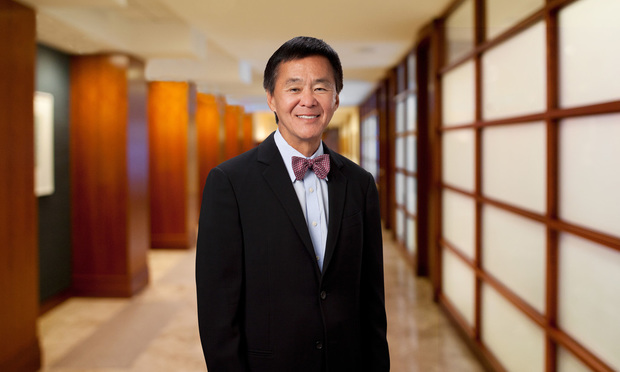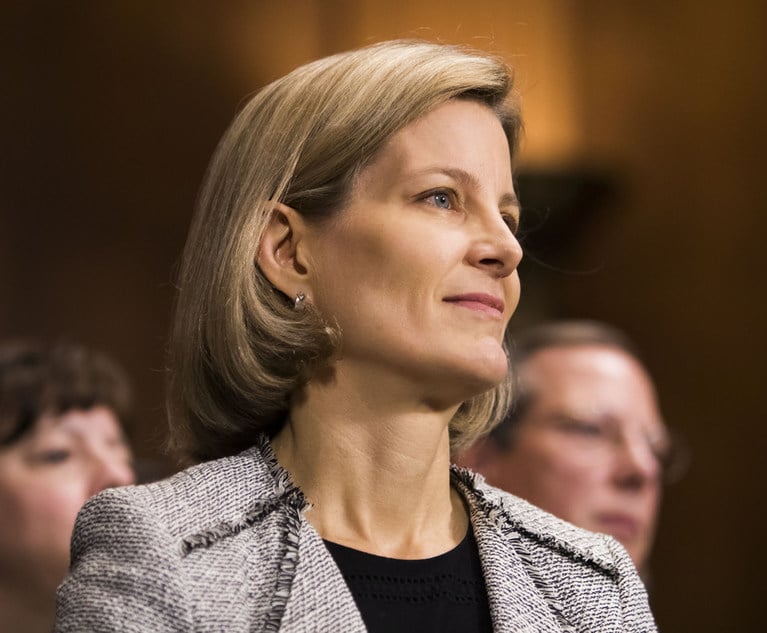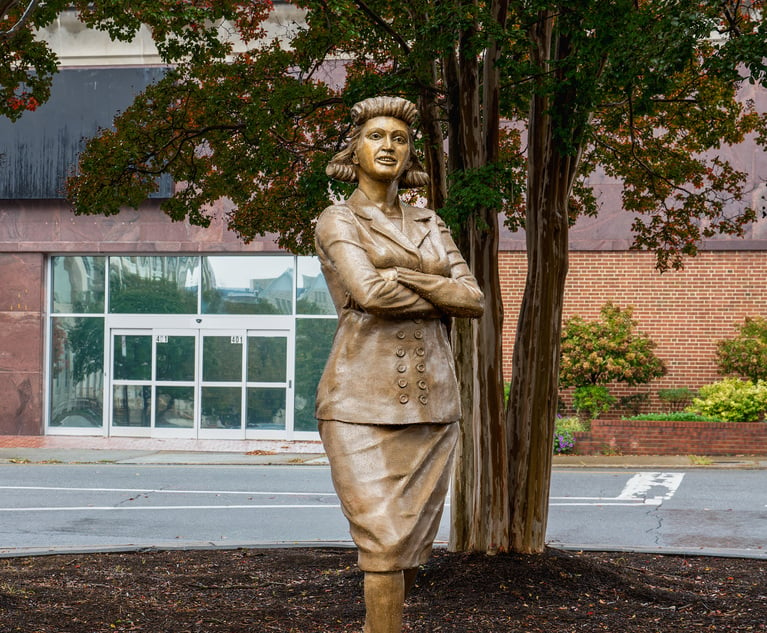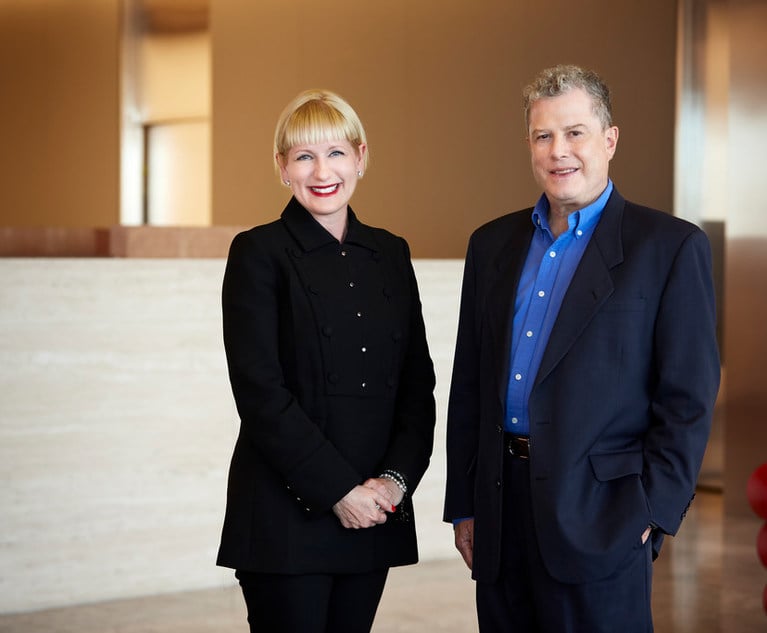Supreme Court Sounds Doubtful About PTO's Claim to Attorneys Fees
Making his first appearance before the Supreme Court, Irell's Morgan Chu argues that a provision referring to "expenses" isn't specific enough to force patent owners to pay the PTO's in-house attorneys fees.
October 07, 2019 at 07:03 PM
6 minute read
 Morgan Chu of Irell Manella.
Morgan Chu of Irell Manella.The Supreme Court sounded skeptical Monday of the U.S. Patent and Trademark Office's claim to its attorneys fees when dissatisfied patent applicants sue the agency in federal district court.
Justices Neil Gorsuch, Brett Kavanaugh, Stephen Breyer, Sonia Sotomayor and Ruth Bader Ginsburg all sounded hung up on the same two issues that led the U.S. Court of Appeals for the Federal Circuit to the same negative conclusion: Section 145 of the Patent Act awards "all of the expenses of the proceedings" to the PTO, but doesn't specifically mention attorneys fees. And despite the provision having been on the books for 170 years, the PTO itself didn't start enforcing it until 2013.
"Is there any other federal statute that provides for attorneys fees on the basis of the word 'expenses' alone?'" Ginsburg asked Deputy Solicitor General Malcolm Stewart, who represented the PTO during arguments in Peter v. NantKwest.
"Are there other statutes that provide for fees, attorneys' fees, that are awarded against the prevailing party?" asked Kavanaugh.
Stewart's answer to both questions was no, other than an identical provision for district court challenges when trademark registration is denied. The Fourth Circuit blessed the PTO's recovery of fees under that provision in 2015.
Stewart had a tougher time explaining why the PTO had forgone its in-house attorneys fees for more than 160 years if the statute clearly provides them. "There is no question this is an atmospherically unhelpful point for us," he said at one point. But he argued that the 2011 America Invents Act changed the landscape by making the PTO self-funded. The agency subsequently determined that applicants who increase the agency's expenses through litigation ought to bear the expense, including its attorneys fees, rather than forcing it on other applicants.
Irell & Manella partner Morgan Chu, a legend of the intellectual property bar making his first appearance before the Supreme Court, had an easier time. He argued that the government "is arguing for a radical departure from the American Rule" against fee shifting. And the Supreme Court has said the American rule applies absent "specific and explicit" language from Congress. Chu used the phrase "specific and explicit" four times during his argument.
He didn't get challenged very hard. Breyer briefly quizzed him at one point about Congressional intent but abandoned the inquiry. "I know what you're going to say," Breyer said.
"If I look puzzled, I would like to withdraw my puzzled look," Chu joked.
"You don't look puzzled," Breyer assured him.
After being denied a patent on a method for treating cancer, NantKwest initiated what's known as a Section 145 proceeding in district court to try to force the PTO to issue it. Section 145 of the Patent Act provides that "all the expenses of the proceedings shall be paid by the applicant," regardless of the outcome of the case.
NantKwest lost the suit, and the PTO moved for $78,592 in attorneys fees. The PTO had not sought attorneys fees in such a case for more than 100 years but says it changed its policy after the Supreme Court in 2012 broadened the kinds of evidence and discovery that can be introduced in Section 145 proceedings. The agency argues that if the applicant doesn't pay, the PTO will have to charge other applicants more to make up the shortfall.
NantKwest argues that spreading attorneys fees from 145 proceedings would add only $1.60 per applicant. Patent owners more generally have argued that the PTO is using the fee-shifting threat to try to discourage them from vindicating their rights in court.
The Federal Circuit agreed with NantKwest in a 7-4 en banc ruling, setting up a split with the Fourth Circuit.
On Monday, the Supreme Court had a lot of the same questions as the Federal Circuit judges did at the en banc arguments.
"You had a lawyer here, right, who works for the government anyway," Gorsuch told Stewart. "It's not like you went out and hired a lawyer."
"Would [you] say that in all the years that you weren't [collecting fees], you were violating the statute because the statute is mandatory?" Ginsburg asked.
Stewart told Ginsburg no, that the agency was merely "foregoing a source of income that we were entitled to get."
"We don't have a body of lower court case law saying that the term 'expenses' doesn't include personnel expenses," Stewart told the court.
The only difficulty for Chu came when Ginsburg and Kagan pointed out that the court has said it won't require Congress to include the "magic words" attorneys fees to trigger fee shifting. But under Chu's position, "it basically has to say lawyers?" Kagan asked.
"Or words to that effect, yes," Chu said.
"Well, what does 'words to that effect' mean?" Kagan asked.
"Counsel, compensation for legal counsel, for advice, whatever," Chu replied.
Justice Samuel Alito also had a brief moment of skepticism. "Maybe it is only going to be $1.60, but still, other people are paying th[ese] expenses. Doesn't that make that different from the American Rule?" he asked.
That's up for Congress to decide, Chu answered.
He said one of the best indicators of how Congress intended the provision to apply at the time of its drafting is the way "scores, maybe hundreds, of senior Patent Office officials" applied it up until 2012. "Not a one of them thought that the plain and ordinary meaning of 'expenses' in Section 145 or its predecessors included attorneys fees," he said.
"Is there any language short of saying explicitly 'attorneys' fees' that would overcome the American Rule?"
The PTO and the Justice Department argued in their petition for cert that the Fourth Circuit has awarded fees in a Section 145 appeal. The filing included U.S. Solicitor General Noel Francisco and Assistant Attorney General Jody Hunt, who heads the Civil Division.
PTO Director Andrei Iancu joined the agency in 2017 from Irell, so he is recused from the case. That's why Deputy Director Laura Peter's name appears in the caption.
This content has been archived. It is available through our partners, LexisNexis® and Bloomberg Law.
To view this content, please continue to their sites.
Not a Lexis Subscriber?
Subscribe Now
Not a Bloomberg Law Subscriber?
Subscribe Now
NOT FOR REPRINT
© 2025 ALM Global, LLC, All Rights Reserved. Request academic re-use from www.copyright.com. All other uses, submit a request to [email protected]. For more information visit Asset & Logo Licensing.
You Might Like
View All
'Irreparable Harm'?: US Judge Denies Big Pharma Motion to Halt FDA-Approved Generic Drug
3 minute read
'Johns Hopkins Preyed on Black Women': Ben Crump Reps Henrietta Lacks Estate
3 minute read
Several Am Law 100 Firms Help Compliance Startup SingleFile Raise $6.5M

Jenner, Looking at 'Stretch' Goals, Reached Double-Digit Revenue and Profit Growth
5 minute readTrending Stories
- 1No Two Wildfires Alike: Lawyers Take Different Legal Strategies in California
- 2Poop-Themed Dog Toy OK as Parody, but Still Tarnished Jack Daniel’s Brand, Court Says
- 3Meet the New President of NY's Association of Trial Court Jurists
- 4Lawyers' Phones Are Ringing: What Should Employers Do If ICE Raids Their Business?
- 5Freshfields Hires Ex-SEC Corporate Finance Director in Silicon Valley
Who Got The Work
J. Brugh Lower of Gibbons has entered an appearance for industrial equipment supplier Devco Corporation in a pending trademark infringement lawsuit. The suit, accusing the defendant of selling knock-off Graco products, was filed Dec. 18 in New Jersey District Court by Rivkin Radler on behalf of Graco Inc. and Graco Minnesota. The case, assigned to U.S. District Judge Zahid N. Quraishi, is 3:24-cv-11294, Graco Inc. et al v. Devco Corporation.
Who Got The Work
Rebecca Maller-Stein and Kent A. Yalowitz of Arnold & Porter Kaye Scholer have entered their appearances for Hanaco Venture Capital and its executives, Lior Prosor and David Frankel, in a pending securities lawsuit. The action, filed on Dec. 24 in New York Southern District Court by Zell, Aron & Co. on behalf of Goldeneye Advisors, accuses the defendants of negligently and fraudulently managing the plaintiff's $1 million investment. The case, assigned to U.S. District Judge Vernon S. Broderick, is 1:24-cv-09918, Goldeneye Advisors, LLC v. Hanaco Venture Capital, Ltd. et al.
Who Got The Work
Attorneys from A&O Shearman has stepped in as defense counsel for Toronto-Dominion Bank and other defendants in a pending securities class action. The suit, filed Dec. 11 in New York Southern District Court by Bleichmar Fonti & Auld, accuses the defendants of concealing the bank's 'pervasive' deficiencies in regards to its compliance with the Bank Secrecy Act and the quality of its anti-money laundering controls. The case, assigned to U.S. District Judge Arun Subramanian, is 1:24-cv-09445, Gonzalez v. The Toronto-Dominion Bank et al.
Who Got The Work
Crown Castle International, a Pennsylvania company providing shared communications infrastructure, has turned to Luke D. Wolf of Gordon Rees Scully Mansukhani to fend off a pending breach-of-contract lawsuit. The court action, filed Nov. 25 in Michigan Eastern District Court by Hooper Hathaway PC on behalf of The Town Residences LLC, accuses Crown Castle of failing to transfer approximately $30,000 in utility payments from T-Mobile in breach of a roof-top lease and assignment agreement. The case, assigned to U.S. District Judge Susan K. Declercq, is 2:24-cv-13131, The Town Residences LLC v. T-Mobile US, Inc. et al.
Who Got The Work
Wilfred P. Coronato and Daniel M. Schwartz of McCarter & English have stepped in as defense counsel to Electrolux Home Products Inc. in a pending product liability lawsuit. The court action, filed Nov. 26 in New York Eastern District Court by Poulos Lopiccolo PC and Nagel Rice LLP on behalf of David Stern, alleges that the defendant's refrigerators’ drawers and shelving repeatedly break and fall apart within months after purchase. The case, assigned to U.S. District Judge Joan M. Azrack, is 2:24-cv-08204, Stern v. Electrolux Home Products, Inc.
Featured Firms
Law Offices of Gary Martin Hays & Associates, P.C.
(470) 294-1674
Law Offices of Mark E. Salomone
(857) 444-6468
Smith & Hassler
(713) 739-1250








